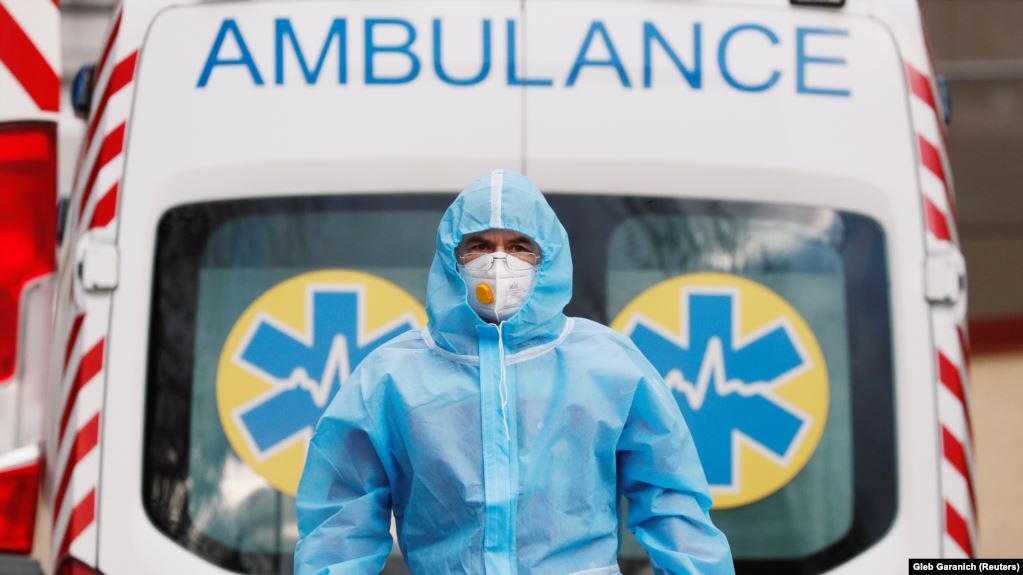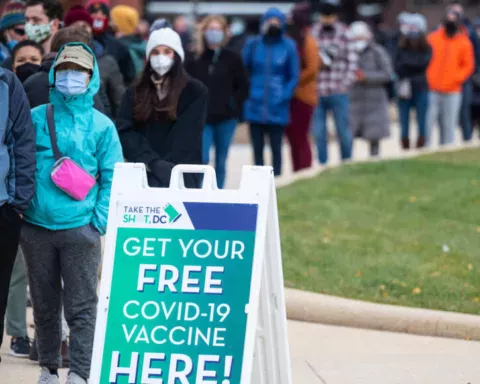Among others, they are working together to bolster laboratory capacity, increase staff and help improve skills. In parallel, they are also teaming up to make surveillance and prevention a priority to fight the pandemic and build the legacy of sustainable and resilient health systems.
Cabo Verde: training in field epidemiology, with support from Brazilian experts

The National Institute of Public Health (INSP), in partnership with WHO and other partners, provided an intensive training on field epidemiology for experts from the sectors of human, animal and environmental health. The Brazilian Association of Field Epidemiology Professionals (ProEpi) provided the training. The need for the Cape Verde to develop a field epidemiology programme was requested back in 2019, as a result of the joint external evaluation carried out with WHO assistance.
Uganda: Danish support for the COVID-19 resurgence response

WHO Representative in Uganda, Dr Yonas Tegegn Woldemariam (second from left) and Mr Henrik Jespersen, Head of Cooperation, Royal Danish Embassy in Kampala (right), exchange signed agreements witnessed by Honourable Hanifa Kawooya (second from right) and Dr Diana Atwine (left) at the Ministry of Health headquarters in Kampala
The Government of Denmark through the Danish Embassy in Uganda has extended a grant to the Government of Uganda, through WHO, to support the implementation of the COVID-19 Resurgence Response Plan developed by the Ministry of Health.
The year-long project will support coordination of the COVID-19 response by strengthening case detection, reporting and response in community schools and closed settings. This is a key element to help Ugandan health authorities improve the management of severe and critical COVID-19 cases.
Uzbekistan: progress despite the pandemic, with support from WHO, UN and USAID
Even before the pandemic, WHO has been supporting Uzbekistan to strengthen the country’s pandemic preparedness, to develop communications materials, boost laboratory testing capacity, and strengthen the health system to effectively treat patients with COVID-19. WHO has also been supporting the country in strengthening capacities to deliver universal health coverage through a primary health care approach.
Since the start of the pandemic, contextually and culturally relevant risk communications have been designed and delivered, with help from various United Nations agencies. The Ministry of Health led the creation of posters, infographics and brochures in Uzbek, Russian, Karakalpak and Braille languages to inform the general public, administrators of schools and preschools, and travelers about the virus, to give advice on protective behaviours, and to dispel emerging myths about the pandemic.
The support of the United States Agency for International Development (USAID) focused on strengthening pandemic preparedness. For instance, already back in December 2020, WHO/Europe and the WHO Country Office joined forces with the Ministry of Health and the Sanitary and Epidemiological Welfare and Public Health Service to issue the first weekly national influenza and acute respiratory viral infection bulletin.
WHO also helped the Government in a Joint External Evaluation (JEE) to identify possible gaps in areas of health system emergency preparedness.
Latin America and the Caribbean: a regional Genomic Surveillance Network tracks COVID-19 virus variants

The region faces an avalanche of worsening health issues as COVID-19 continues to disrupt health services. The Pan American Health Organization (PAHO/WHO) reported that the Americas’ one-year-old regional genomic surveillance network keeps a close eye on the emergence and spread of SARS-CoV-2 variants throughout the region. It is instrumental in monitoring the spread of the virus within border regions and among travelers. So far, 47 countries and territories in the Americas have detected at least one variant of concern and 11 have detected all four of them – Alpha, Beta, Gamma and Delta.
Having started as a handful of public health laboratories in 2020—including the labs Fundação Oswaldo Cruz/FIOCRUZ – Brazil and Instituto de Salud Pública de Chile (ISPCH), which carry out sequencing for countries without local capacity—the surveillance network has grown to include 24 laboratories in total, among them four additional reference laboratories from Mexico, United States of America, Panama and Trinidad and Tobago.
Saudi Arabia: Successful and safe hajj 2021 season during the COVID-19 pandemic

As the hajj season concluded, WHO acknowledged the efforts of Saudi Arabia to implement health and safety measures successfully, as no cases of COVID-19 or other illnesses were reported among pilgrims. The host country applied innovative technology procedures to protect the health of pilgrims. Electronic cards, which registered the pilgrims’ contacts and all medical details, were used to provide access to all religious sites, accommodation and transport. These also helped facilitate the job of health authorities to identify crowded areas at all sites. In addition, Saudi Arabia used electronic robots to prevent physical contact and disperse physical gatherings. Robots distributed bottled water and kept religious sites well-sanitized. Strict physical distancing measures were respected in the two Holy Mosques, the central areas in Makkah and Madinah and in all residential buildings and tents. All measures were based on a risk assessment and the evolving epidemiology nationally, regionally and globally.
Ghana: Norwegian Ambassador reiterates support for the WHO Country Office

The Norwegian Ambassador to Ghana, H.E. Gunner Andreas Holm, has reiterated his Government’s commitment to ensuring that essential health services continue as the COVID-19 pandemic persists. The WHO Representative to Ghana Dr Kasolo acknowledged the role of the Government of Norway as a key WHO donor. Norway stands out as one of the key global players, showing great commitment in a number of WHO priority areas including Universal Health Coverage, health security, healthier populations and risk factors that drive diseases. Norway is supporting the implementation of a 5-year non-communicable diseases (NCDs) Initiative in 4 countries including Ghana to scale-up NCD prevention and control, in line with the WHO NCD Global Action Plan.
Guatemala: donation and support from PAHO/WHO and Germany

In recent weeks, the Guatemala has experienced the highest levels of transmission since the beginning of the pandemic. In response, health authorities boosted prevention measures such as the use of masks, hand washing and physical distancing, among other non-pharmacological actions, to reduce transmission and exposure, and protect the most vulnerable by reducing mortality and morbidity.
The German Cooperation, through the Pan American Health Organization/World Health Organization (PAHO/WHO), donated close to half a million surgical masks to the Ministry of Public Health and Social Assistance (MSPAS), for the use and protection of health workers and personnel in public hospitals and health area directorates in the country. Germany has also supported the Ministry of Health and civil society organizations with donations of ventilators, tests and medical supplies, as well as training in national laboratories.
***
Learn more about WHO’s support to countries around the world to accelerate the achievement of health for all through a primary health care approach.
With the support of donors and partners, WHO is reaching countries in need to help strengthen their health systems and ensure continuity of essential health services during the COVID-19 pandemic.
Partners and donors recognized in this feature are the governments of Denmark, Germany, Norway and the United States, and health stakeholders such as the Brazilian Association of Field Epidemiology Professionals (ProEpi).
WHO thanks all governments, organizations and individuals contributing to the COVID-19 response around the world since the beginning of the outbreak, and in particular those who have provided fully flexible contributions, to ensure a comprehensive response the pandemic.
Contributors as of 31 July 2021:
Member States and other governments in 2021:
Australia, Belgium, Canada, Denmark, Egypt, France, Germany, Ireland, Isle of Man, Israel, Italy, Japan, Kingdom of Saudi Arabia, Kuwait, Lesotho, Mali, Malta, Mauritania, Monaco, Netherlands, New Zealand, Norway, Philippines, Portugal, Republic of Korea, Sao Tome and Principe, Slovak republic, Spain, Sweden, Switzerland, Thailand, United Kingdom, United States.






